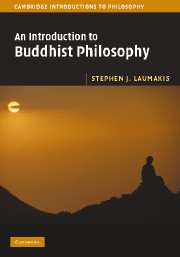Book contents
- Frontmatter
- Contents
- Acknowledgments
- Epigraph
- Preface
- Part I A sketch of the Buddha and the Dhamma
- Part II Details of the Dhamma
- Part III Development of the Dhamma/Dharma
- 9 Bodhidharma's and Huineng's Buddhisms
- 10 Pure Land Buddhism
- 11 Tibetan Buddhism
- 12 Two forms of contemporary Buddhism
- Glossary
- Bibliography
- Index
11 - Tibetan Buddhism
Published online by Cambridge University Press: 05 June 2012
- Frontmatter
- Contents
- Acknowledgments
- Epigraph
- Preface
- Part I A sketch of the Buddha and the Dhamma
- Part II Details of the Dhamma
- Part III Development of the Dhamma/Dharma
- 9 Bodhidharma's and Huineng's Buddhisms
- 10 Pure Land Buddhism
- 11 Tibetan Buddhism
- 12 Two forms of contemporary Buddhism
- Glossary
- Bibliography
- Index
Summary
Key terms and teachings
Bodhicitta: Sanskrit term for “thought of enlightenment/awakening.” In Mahayana Buddhism it refers to the enlightened mind of a bodhisattva.
Dharani: Sanskrit term for an extended mantra used to focus the mind and help it retain teachings.
Guru: Sanskrit term for “teacher,” commonly found in the Vajrayana tradition.
Dalai Lama: Literally “Great Ocean” (dalai) “Teacher” (lama), the title designates the temporal and spiritual leader of Tibet. The Mongol ruler, Altan Khan, originally bestowed the title upon the “third” Dalai Lama.
Mahamudra: Sanskrit term for “Great Seal,” in Vajrayana Buddhism it refers to the meditative practices that lead to enlightenment, and insight into the unity of wisdom and compassion and samsara and emptiness.
Mandala: Sanskrit term for a sacred circle that symbolically represents the world and what exists. In Tantric Buddhism it is thought to represent the mind, body, and speech of a Buddha and is used in meditation practices.
Mantra: Sanskrit term for sacred sounds that are thought to possess supernatural/spiritual powers.
Mudra: Sanskrit term meaning “seal” or “sign,” it refers to a symbolic gesture using the hands or body to represent an aspect of the Buddha's teaching.
Why study Tibetan Buddhism?
The purpose of the final two chapters of Part III is to complete our account of the “Development of the Dhamma/Dharma” by considering the features of Tibetan Buddhism and the particular ideas and teachings of two influential and popular teachers of contemporary Buddhism – the Dalai Lama and Thich Nhat Hanh.
- Type
- Chapter
- Information
- An Introduction to Buddhist Philosophy , pp. 229 - 246Publisher: Cambridge University PressPrint publication year: 2008

